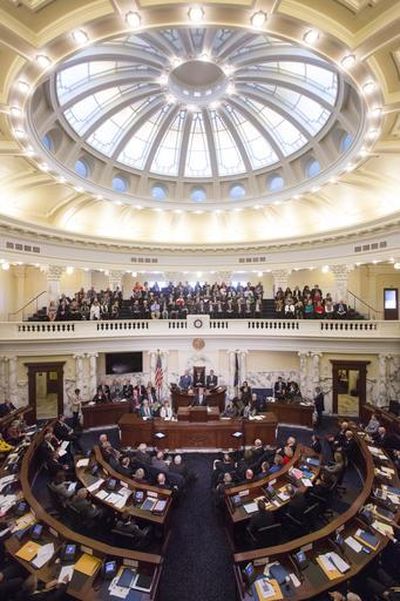Idaho Gov. Otter focuses on education, sets up fight with fellow R’s over tax cuts

BOISE – Idaho Gov. Butch Otter put his focus squarely on education Monday as he kicked off the legislative session, bitterly disappointing many House Republicans by ruling out big new tax cuts.
Otter told a joint session of the House and Senate that he’s “as committed as ever” to limiting the size and growth of Idaho’s state government. But, he said, “I will not entertain anything that undermines our commitment to meeting the essential state government functions, and at the top of that list is our investments in improving education and career readiness in Idaho.” Lawmakers responded with applause.
But after the speech, House Speaker Scott Bedke, R-Oakley, said he disagreed with Otter that a proposed cut in unemployment insurance taxes is sufficient tax relief for lawmakers to consider this year. The cut would save Idaho employers $46 million next year.
“I appreciate that that’s a large tax reduction to businesses in Idaho,” Bedke said, but he thinks “we can do a little better than that.”
He added, “There’ll be give and take – we will certainly discuss this.”
Otter outlined a proposed budget for the coming year that would increase general fund spending by 5.87 percent next year to $3.465 billion. That still would leave unspent $68 million, according to the latest state revenue forecasts. The governor called for 3 percent merit-based raises for state employees; a 6.4 percent increase in public school funding; a smaller 2.2 percent hike for the state’s public universities coupled with a one-time $35 million boost in campus construction; and a 6.4 percent increase for community colleges. Overall, 63 percent of Otter’s proposed fiscal year 2018 budget would go to education, including both K-12 and higher education.
In addition to the public school budget, the governor’s proposal includes $5 million he’d send to the state Board of Education to help principals improve low-performing schools and train school administrators on evaluating teachers. The state’s “career ladder” teacher pay plan – for which Otter recommended full funding next year of $58 million – relies on accurate teacher evaluations to grant performance-based raises.
Sen. Shawn Keough, R-Sandpoint, co-chair of the Legislature’s powerful joint budget committee, said she liked Otter’s message, that “ the keys to our continued success in the future are investment in our K-through-career system.”
Keough said she agreed with Otter that those investments must come before big tax cuts like reducing Idaho’s personal and corporate income tax rates, which many House Republicans favor.
“Certainly, constituents at home are interested in paying less taxes,” Keough said. “But they are also consistently telling me they believe the state ought to be fully funding its mandate of a public school system, and that the continual ask for ‘supplemental levies’ for basic operations of the schools is something the state ought to be picking up.”
Still, she predicted that that tradeoff will be “one of the main issues that dominates the session.”
Otter’s proposed budget includes $715,000 for the second year of the University of Idaho’s initiative to move toward offering a four-year degree in computer science in Coeur d’Alene, a move Keough applauded.
But health care advocates were disappointed that Otter offered little hope of a solution to the state’s health coverage gap, in which 78,000 Idahoans make too much to qualify for the state’s limited Medicaid program, but not enough to be eligible for subsidized insurance through the state’s successful insurance exchange. Those are people who make less than 100 percent of the federal poverty level.
“There is broad agreement in this body on the need to help tens of thousands of Idahoans with incomes too high to qualify for Obamacare subsidies but too low to afford health care coverage on their own,” Otter told lawmakers. “Just as clearly, there is very little support for expanding Medicaid. I understand that. It would mean subordinating our Idaho priorities to the siren song of federal dollars and neither the national government nor taxpayers can afford it.”
So what should lawmakers do? “Beyond continuing to seek elusive answers to the policy questions that we’ve been asking for years, we now have the option of waiting to see what the Trump administration and Congress do with Obamacare,” the governor said.
Otter did recommend funding for an $11 million program to provide mental health treatment to newly released prison parolees and probationers, a move recommended under the state’s Justice Reinvestment initiative. If Idaho expanded Medicaid, those services already would be covered.
At a somber afternoon press conference in the Capitol rotunda, members of the “Close the Gap Idaho” coalition warned that Idaho can’t afford to continue to be one of just 19 states not accepting federal funds to expand its Medicaid program. Tim Heinze, CEO of Valley Family Health Care, a community health center that operates clinics both in Idaho and Oregon, said, “Federal health care reform is coming. If Idaho continues to opt out, we may find ourselves left out.”
House and Senate Democrats lauded the governor for focusing on education, but faulted him for not addressing early-childhood education – Idaho has no state-funded preschool – or rising college tuitions.
House Minority Leader Mat Erpelding, D-Boise, said minority Democrats will introduce bills to raise the minimum wage, ban discrimination based on sexual orientation or gender identity, and create a state Office of Inspector General to investigate corruption and abuses in state government. The Democrats have unsuccessfully pushed all three concepts for the past several years.